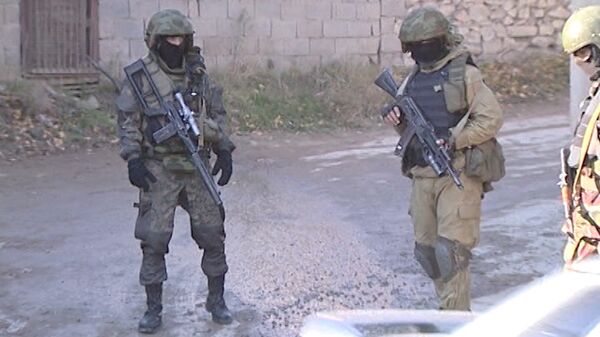NALCHIK/MAKHACHKALA, November 20 (RIA Novosti) – Russian law enforcement forces said Wednesday that they have killed an Islamist militant they suspect of ordering a recent bombing attack on a passenger bus in the southern city of Volgograd.
The National Anti-Terrorism Committee said in a statement Wednesday that Murad Kasumov was one of three suspected militants killed during a standoff with police in Makhachkala, the capital of the restive republic of Dagestan.
Firearms found on the bodies of the alleged militants had been used in the killings of several judges and law enforcement officials in Dagestan, a committee spokesman said.
Kasumov’s killing marks the latest response by authorities to the apparent suicide bombing Volgograd on October 21, which officials say was carried out by 30-year-old Naida Asiyalova from Dagestan. Six people were killed as an immediate result of the bombing, and authorities said a seventh person on the bus died earlier this week.
On Saturday, security forces in Dagestan shot dead Asiyalova’s husband, Dmitry Sokolov, a 21-year-old suspected of being involved in organizing the Volgograd attack.
According to the National Anti-Terrorism Committee, Kasumov had headed up an armed gang since the start of this year and was involved in a terrorist attacks in Dagestan.
“It is known that Dmitry Sokolov made the bomb for the suicide terrorist attack in the city of Volgograd on Kasumov’s instructions,” the committee said in its statement.
Another two alleged militants were killed Tuesday in a forest in Kabardino-Balkaria, a republic neighboring Dagestan, in an exchange of gunfire with government forces.
Local police said the militants shot at officers trying to apprehend them and were fatally wounded by return fire.
The National Anti-Terrorism Committee told RIA Novosti on Wednesday that four other suspected militants had been killed in Dagestan, in a town on the border with Chechnya. Police said that only two of the suspects had been identified.
Russia’s North Caucasus is plagued by violence caused by a number of factors, including ethnic tensions, poverty, corruption and a resilient Islamic insurgency.
Fifty-nine people were slain in Kabardino-Balkaria in the first nine months of this year, and another 239 in Dagestan, according to independent news website Kavkaz-uzel.ru.
Updates with more suspected militants killed in Dagestan.


